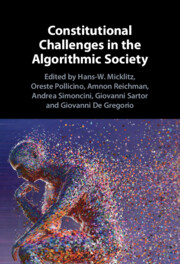Constitutional Challenges in the Algorithmic Society
New technologies have always challenged the social, economic, legal, and ideological status quo. Constitutional law is no less impacted by such technologically driven transformations, as the state must formulate a legal response to new technologies and their market applications, as well as the state’s own use of new technology. In particular, the development of data collection, data mining, and algorithmic analysis by public and private actors present unique challenges to public law at the doctrinal as well as the theoretical level. This collection, aimed at legal scholars and practitioners, describes the constitutional challenges created by the algorithmic society. It offers an important synthesis of the state of play in law and technology studies, addressing the challenges for fundamental rights and democracy, the role of policy and regulation, and the responsibilities of private actors. This title is also available as Open Access on Cambridge Core.
Hans-W. Micklitz is Professor of Economic Law at the Robert Schuman Centre for Advanced Studies at European University Institute, Florence and Finland Distinguished Professor at the University of Helsinki.
Oreste Pollicino is Full Professor of Constitutional Law at Bocconi University and Member of the Executive Board, European Agency for Fundamental Rights.
Amnon Reichman is Full Professor of Constitutional Law at the University of Haifa.
Andrea Simoncini is Full Professor of Constitutional Law at the University of Florence.
Giovanni Sartor is Professor of Legal Informatics at the University of Bologna and Professor of Legal Informatics and Legal Theory at the European University Institute of Florence.
Giovanni De Gregorio is a Postdoctoral Researcher at the Centre for Socio-Legal Studies at the University of Oxford.

